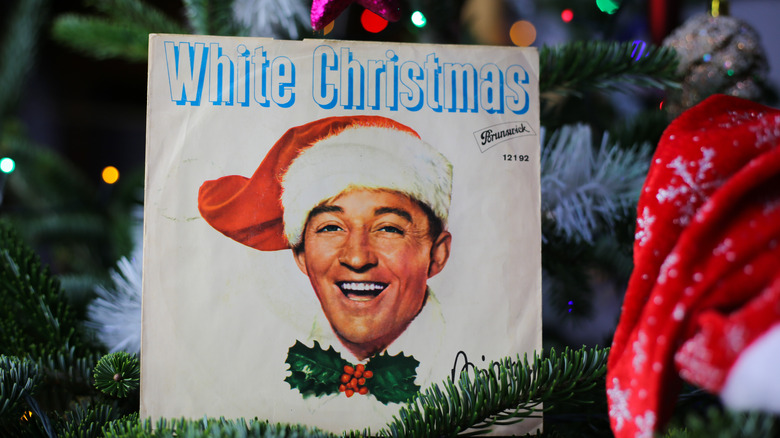This Is The Best Selling Single Of All Time
"Songs make history and history makes songs," songwriter Irving Berlin reportedly once said. This statement is strikingly true of one of Berlin's own songs, "White Christmas." The Christmas song has made history for being the best-selling single of all time — largely because of the historical context surrounding the song's release.
According to Guinness World Records, "White Christmas" has sold more than 50 million copies worldwide. (Toss in album and other sales, and the number tops 100 million, says The Wall Street Journal.) Berlin included the song among his compositions for the 1942 movie "Holiday Inn," starring Fred Astaire and Bing Crosby. The first time Crosby heard the song, he reportedly said to Berlin, "I don't think we have any problems with that one, Irving" (via TIME). Crosby recorded the initial version of the song in 18 minutes on May 29, 1942. The song was released on the "Holiday Inn" soundtrack later that summer, and in October, it hit number one on the National List of Best-Selling Retail Records. It remained in the top spot for 11 consecutive weeks. Over the years that followed, it would reappear in the top charts several more times, per The Bing Crosby Internet Museum.
It may be surprising that a song that is only relevant at a certain time of year would be more commercially successful than songs that are more acceptable to play the remaining 11 months of the year. But there's a history behind the song's lasting impact on popular culture.
'White Christmas' made history as a secular, World War II Christmas anthem
According to The Bing Crosby Internet Museum, Irving Berlin was tasked with writing a song for each major holiday for the movie "Holiday Inn." He struggled most with the Christmas song because he was Jewish. Still, he drew upon his experiences of Christmastime in New York and California, and ended up writing one of the first secular Christmas songs.
"The whole idea of secular Christmas songs really didn't exist before Berlin," composer and pianist Rob Kapilow said during an appearance on PBS News Hour. "Composers and publishers thought, 'Why write a Christmas song? They will only play it once a year.' But, in fact, the success of this actually launched a whole genre of secular Christmas songs."
Another aspect of the song's power was its timing. According to The Wall Street Journal, Bing Crosby first performed the song publicly on his national radio show on Christmas Eve in 1941, a few weeks after the attack on Pearl Harbor. The recording was released the next year. It was full of nostalgia and yearning at a time when many members of the United States armed forces were away from home for Christmas for the first time. "The song and the movie [came] out just when the Americans [were] spending their first winter away from home," Kapilow said. "And, suddenly, that nostalgic tug of Christmases past, of that mythic American past, for all the Americans overseas, as well as their families at home missing them, suddenly made the song immensely popular in a way that Berlin never anticipated."

